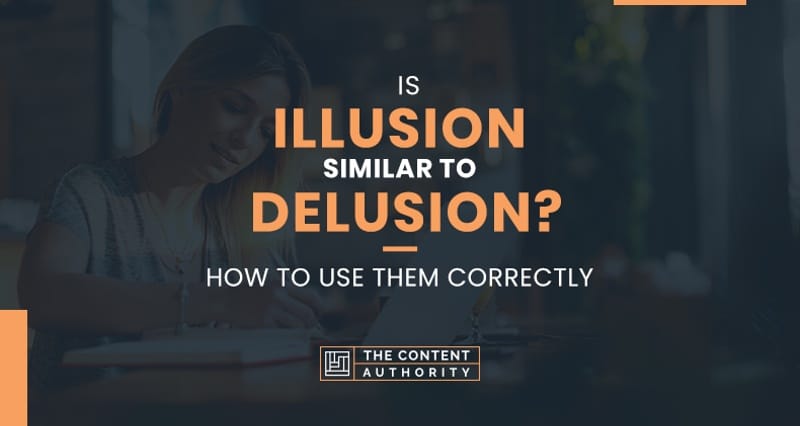We are all concerned about using the right words when writing in English. However, this is not without its challenges, thanks to similar yet distinct words. As such, you might be wondering, is “illusion” similar to “delusion?” When and how do you use them correctly?
“Illusion” is a noun that means any idea that is not true. It also refers to a thing that is not like it appears. “Delusion” is a noun that conveys a belief in something that is false. While both words are similar, “illusion” relates to a plain misconception while “delusion” to a negative one.
Still, there is more to be learned before you are at ease that you have got it all covered. We bet you are looking to get right to this. Well, we have got you covered. In this article, we will tell you all you need to know.
When and How to Use the Word “Illusion” in a Sentence
Our first concern is when and how to use the word “illusion in a sentence. In turn, we are obliged to examine the nature and meaning of the word. This is because this will determine the appropriate manner to use the word.
So, what do we mean when we say the nature of the word? The nature of a word refers to the way it functions when you use it in a sentence. As you can guess, this is based on the part of the speech that you categorize the word under. In turn, a word can have a single nature or have a multiple nature.

On the other hand, the meaning of the word is precisely the thoughts and ideas that the world presents to a reader. For instance, when you see the word “sleep,” it immediately brings to fore a condition where the body is at rest. Well, what it brings to mind is precisely the meaning of the word.
As in the case of a word’s nature, a word can have multiple meanings. This can be due to the presence of multiple natures. However, in some instances, a word can also retain multiple meanings within one single nature. Now that you understand this, let us explain its relationship to the word “illusion.”
The word “illusion” is a noun. In turn, it functions as a naming word within a sentence. So, when you use it in a sentence, you must use the word “illusion” in such a way that it identifies something. Of course, it must act as either the subject or object of the sentence.
Now, let us get to the meaning of the word illusion. As we explained above, while it has a single nature, the word “illusion” has multiple meanings that it conveys. So, when you use it in a sentence, it can convey any of the following.
First, it can refer to any idea that is not true. Precisely, a presupposed reality that does not exist in fact. So, you can use the word “illusion” in a sentence when you want to convey an unreal or untrue idea. Here are some examples that show the use of the word in this sense.
- I think it is high time you drop the illusion that you control what I can do.
- The calmness of his home easily provides an illusion of peace and security to outsiders.
- Today, thanks to the emergence of the internet and social media, anonymity remains an illusion.
Beyond this, the word “illusion” also refers to an image, object, or concept that appears to be “X” when it is not really such. Remember, even with this meaning, it remains a noun. However, unlike in the first instance, it is not just something that is unreal.
In this instance, the object or image, or concept is real. However, it appears in a form that is not its form. So, if you are looking to convey that an object or image is not like it appears, then you can use the word “illusion.” Now, here are some examples that bring further clarity to this meaning.
- Every mirror can create an optical illusion that brings quite some thoughts to your mind.
- The oasis you see is merely an illusion designed to keep people away from the truth.
- Look far ahead; you should see a lake. Unfortunately, it is merely an illusion that everyone falls for.
When and How to Use the Word “Delusion” in a Sentence
Next up, we will tell you when and how to use the word “delusion” in a sentence. However, to enable us to do this appropriately, we will need to dive into the nature and meaning of the word “delusion.”
Like we explained above, the nature of a word refers to the word’s function in a sentence. This is usually determined by the part of speech that the word falls under. In contrast, the word’s meaning refers to the idea that the word conveys in a sentence.
So, what is the nature and meaning of the word “delusion,” and how does it affect how you use it in a sentence?
Well, the word “delusion” is also a noun by nature. As such, it functions as a naming word that identifies something. Also, as with other nouns, it functions as either the object or subject in a sentence.
Now, onto its meaning, the word “delusion” conveys that someone believes in a false thing. Now, this is quite similar to the first sense in which the word “illusion” gets used. However, in the case of the word “delusion,” it comes into place when there is a specific belief by someone.
It involves a misleading, mistaken, or false belief, idea, or opinion about something. More precisely, it concerns a misconception that is illogical, deceptive, and contrary to existing factual evidence. It is also related to a condition of a false reality thanks to a mental illness.

Here are some examples that will shed more light on using this word in a sentence.
- I believe he was under the delusion that his wife would support him regardless of his financial situation.
- Some people still adhere strictly to the delusion that their freedom is absolute and without any form of limitation.
- One of the symptoms of schizophrenia is a continuous experience of paranoid delusion by the patient.
- I have no idea why Mary remains in a state of delusion that everyone is out there to persecute her.
Understanding the Difference Between Both Words
Now that we have cleared up when and how to use both words in a sentence, we will address whether both words are similar.
As you can tell, both words function as a noun within a sentence. In fact, they can both function as uncountable and countable nouns depending on the context in which they are used. They both relate to ideas that do not exist, but an individual believes to be real.
From the preceding, it is convenient to conclude that both words are similar. In fact, it is almost compelling to refer to both words as synonyms following these similarities. Well, you will not be wrong to reach this conclusion as there are cases where both words can fit into the same context. See the example below.
- Loads of people feel that the sense and idea of freedom that we loudly claim are merely delusions.
- Loads of people feel that the sense and idea of freedom that we loudly claim is merely an illusion.
As you can see, in both instances, it was appropriate to use either of both words in the sentence. However, that does not mean that the word is not without its differences.
Precisely, the reality is that although quite subtle, both words have some differences. In turn, it is those differences that determine the appropriate word in some particular situations.
So, what is this difference?
The difference is that while “illusion” can be limited to an abstract concept, the word “delusion” is not. When you use the word “delusion,” it relates directly to someone’s misconception about reality. Even more, the word delusions always carry a negative connotation when you use it in a sentence.
If you are not looking to imply negativity and are just looking to imply a mere misconception, then “illusion” will be appropriate. It is simple; the word “illusion” is more suitable to convey an innocent or benign misperception or misconception. On the other hand, if you are looking to convey a negative misconception, then using the word “delusion” becomes appropriate.
Final Thoughts

As you can tell, the English language comes with its fair share of confusion. This is why you might be wondering, is an illusion similar to delusion. Well, in this article, we have discussed all the details to help you appreciate their differences and possible similarities.
We have also shown you when and how to use both words in a sentence. So, remember all we have discussed here. Even more, there is no harm in running through it once more. This way, you can be sure you are writing correctly when you need to use both words.
Shawn Manaher is the founder and CEO of The Content Authority. He’s one part content manager, one part writing ninja organizer, and two parts leader of top content creators. You don’t even want to know what he calls pancakes.

